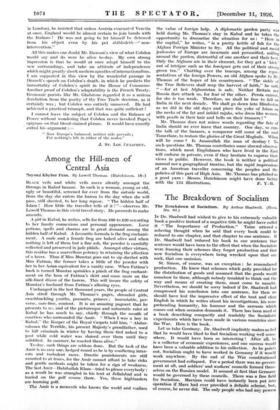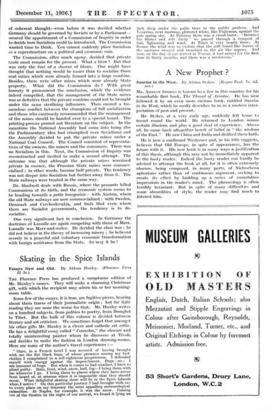The Breakdown of Socialism
The Breakdown of Socialism. By Arthur Shadwell. (Bean. 10s. 6d.)
IF Dr. Shadwell had wished to give to his extremely valuable book a positive instead of a negative title he might have called it " The Importance of Production." Taine- uttered a sobering thought' when he said that every book could be reduced to one chapter, and that chapter to one sentence. If Dr. Shadwell had reduced his book to one sentence that sentence would have been to the effect that when the Socialists were framing their schemes they forgot production and that now Socialism is everywhere being wrecked upon that one rock, that one omission.
St. Simon, of course, was an exception : he remembered production. He knew that schemes which gaily provided for the distribution of goods and assumed that the goods would somehow be there, although nobody troubled to think out the way and means of creating them, must come to naught. Nevertheless, we should be sorry indeed if Dr. Shadwell had compressed his conclusion into one sentence, for then we should have lost the impressive effect of the taut and clear English in which he writes about his investigations, his com- prehending humanity, his humour and the sarcasm which comes out when occasion demands it. There has been need of a book describing compactly and readably the aocialistie experiments which have been made in various countries since the War. Here is the book.
Let us take Gerritany. Dr. Shadwell implicitly makes us feel that he would have liked to find Socialism working well some- where. It would have been so interesting ! Afterall, lie is a collector of economic experiences, and one success would have been a valuable addition to his collection. As he points out, Socialism ought to have worked in Germany if it would work anywhere. By the end of the ,War constitutional government had collapsed. For a period there was no govern- ment at all, and soldiers' and workers' councils formed them- selves on the Russian model. It seemed at first that German.Y would -be governed by these councils. There was a free field for Socialism. Marxism could have instantly been put into Operation if Marx hid ever provided 'a oJelinite schen.* but, of course, he never did. The only people who had any powers
of coherent thought—even before it was decided whether Germany should be governed by Soviets or by a Parliament— secured the appointment of a Commission of Inquiry in order to decide how Socialism could be introduced. The Commission wanted time to think. You cannot suddenly place Socialism as a superstructure on a political and economic ruin.
The Commission, after much agony, decided that private trade must remain for the present. What a blow ! But that was only the first of a shower of blows. One might have thought that nothing would be easier than to socialize those coal mines which were already formed into a large combine. Besides, there were other mines which were already State property. What did the Commission do ? With great honesty it pronounced the conclusion, which the evidence indeed compelled, that the management of the State mines was so defective that the private combine could not be brought under the same sterilizing influences. Then ensued a tre- mendous conflict between the champions of full socialization and those who cautiously recommended that the management of the mines should be handed over to a special board. The printing-presses poured out literature on the subject. In the meantime the National Assembly had come into being (for the Parliamentary idea had triumphed over Sovietism) and the Assembly decided to put the private mines under a National Coal Council. The Council consisted of representa- tives of the owners, the miners and the consumers. There was no Socialism in this. Next, the Commission of Inquiry was reconstructed and invited to make a second attempt. The outcome was that although the private mines remained private in essence, the Prussian State mines were commer- cialized ; in other words, became half private. The tendency was not deeper into Socialism but further away from it. The State railways were treated in the same way.
Dr. Shadwell deals with Russia, where the peasants killed Communism at its birth, and the economic system seems to be heading towards a petite bourgeoisie : with Austria, where the old State railways are now commercialized : with Sweden, Denmark and Czechoslovakia, and finds that even where there are Socialist governments, the tendency is to de- socialize.
One very significant fact in conclusion. In Germany the doctrines of Lassalle are again competing with those of Marx. Lassalle was Marx-and-water. He derided the class war ; he did not believe in the theory of increasing misery ; he believed merely in a peaceful and voluntary economic transformation with benign assistance from the State. So may it be !















































 Previous page
Previous page